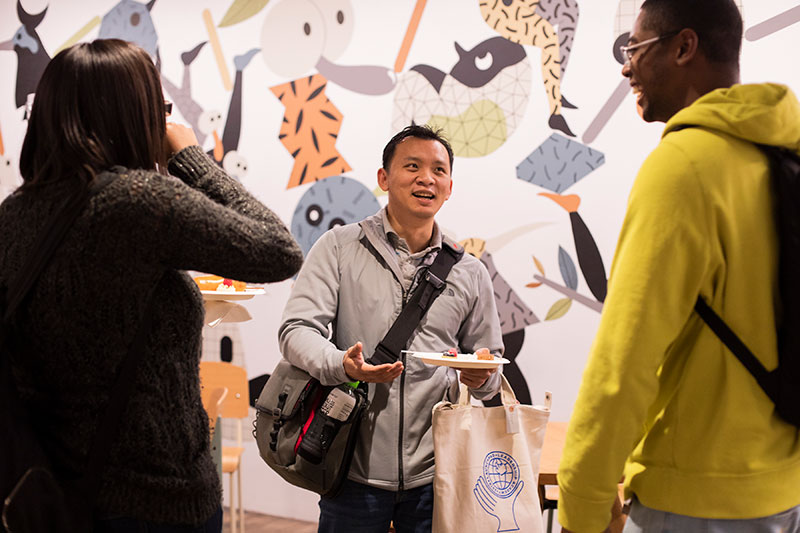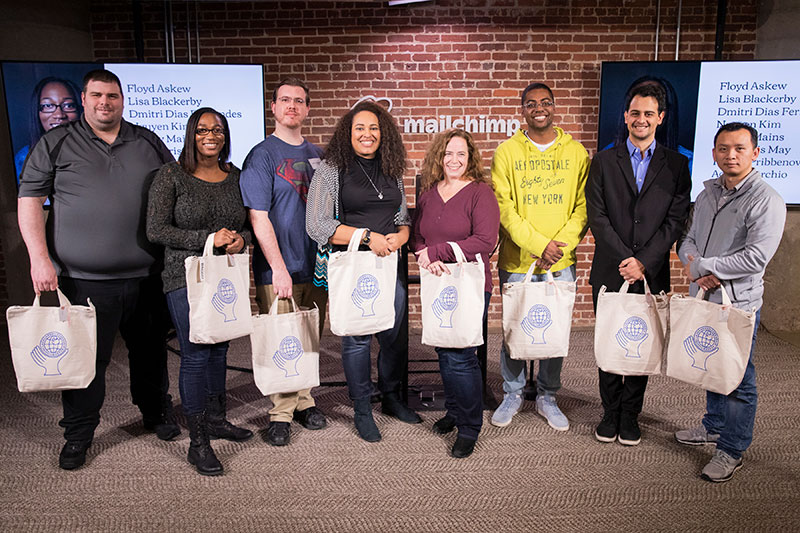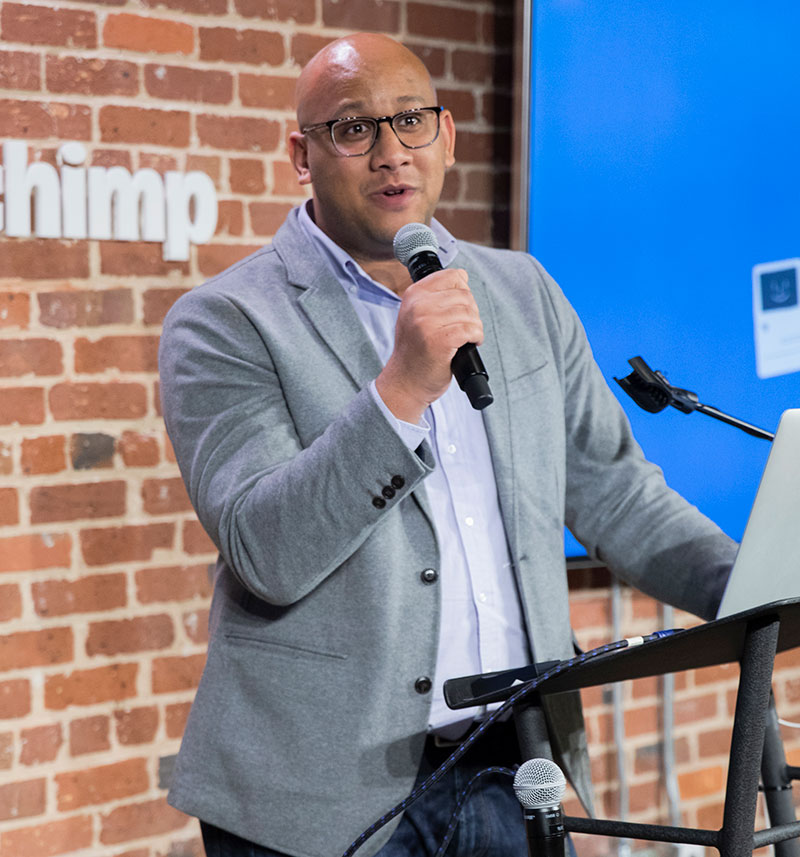Launching Next-Gen Data Masters
Winter 2020 | By Kelly Petty
On the fifth floor of downtown’s hipster hangout, Ponce City Market, is Mailchimp,
a leading email marketing platform known as much for its services as its mammalian
mascot. The company’s offices are completely millennial-driven–co-working spaces,
street art on the walls, a board room complete with actual skateboards and an espresso
machine. It’s a place designed to merge technology with creativity.
But for a group of Clayton State University students, Mailchimp’s office has become
a second home that’s flipping the idea of computer science and information technology
learning on its head.
In 2018, Mailchimp patterned with Clayton State University and made a generous $300,000
investment to establish a leadership program that prepares students for careers in
the IT field. Housed in the university’s College of STEM, Launchpad Academy brings
students and Mailchimp staff together to create a learning environment that reaches
beyond the fundamentals to develop skills students need to be a valuable employee
from day one.
“Talent comes from everywhere, but metro Atlanta’s under-tapped southside stands in
stark contrast to the opportunity-rich communities north of I-20,” says Joe Uhl, chief
architect and vice president of engineering at Mailchimp. “Partnering with Clayton
State gave us the incredible opportunity to tap directly [into] the talent pipeline
at the university, not only to help equip talented students with real-world work experience
but also allow us to bring in new, diverse perspectives that help make our teams stronger
and build better products.”
This is the content for Layout P TagLaunchpad Academy goes beyond classroom lectures
and textbook work to show students how to apply what they’re learning through practical
application. Lessons are more than just writing code; students are taught to test
for website vulnerabilities, fix corrupted code and improve user experience.
“When Launchpad students start their internship at Mailchimp, they tend to know technical
concepts in isolation,” says Josh Penny, corporate citizenship manager at Mailchimp.
“In completing the program, they can apply those concepts to solve problems and achieve
tangible business goals, which helps them grow their confidence and find a deeper
connection to their work.”
In addition to being valuable for the participants, the experience also supplements
the instruction students get at Clayton State.
“I think that what we give them is the basics... [but] they’re learning stuff we don’t
teach them,” says Jillian Jones, lecturer and director of the Launchpad Academy.
Jones remembers sitting in one of the sessions at Mailchimp and watching as students
learned html and JavaScript, web development languages they hadn’t been exposed to
yet in the classroom. The students got to see the code in a web application and run
tests to improve the code.
“They just jumped into it; they weren’t timid. They just started trying to figure
it out,” Jones says. “It was really awesome to see, and that’s exactly what they’re
supposed to do. Nine times out of 10 they’re not going to know the exact language
that they need. They’re going to need to go figure it out.”
Real-world application of the concepts is what makes Launchpad exciting for many of
the students. The program gives them a chance to dive into the latest trends in IT
and data management, as well as improve their problem-solving skills with a “learning-by-
doing” approach.
“It’s cool to see what’s relevant and what’s not,” says senior computer science major
Abu Hassan. “It’s not an ordinary class. It reinforces my love for computer science.”
Beyond gaining insight into software development, cybersecurity and data science,
the students hear personal testimony from Mailchimp employees who share everything
from best practices for various IT problems to what unconventional paths they took
to get into the field. And there is an incentive: Mailchimp selects some members from
the cohort to stay on as interns in their offices.

But what’s more important, Uhl says, is for students to walk away from the program
prepared to enter a workforce built upon a digital economy.
“Launchpad’s purpose is actually quite simple. By helping students gain hands-on learning
experiences in a 21st-century work environment, Mailchimp can help bridge the gap
between what they learn in the classroom and what they can expect in their careers,”
he says. Launchpad is proving to be a success. In its second year, more than a dozen
students have entered the program, and three students from the first cohort have spent
the last year as interns.
For the instructors, Launchpad has given them the opportunity to step away from behind
their desks and take part in shaping the academic curriculum for the students.
“My experience of sharing knowledge of my field that I am so passionate about was
awesome. The students were very inquisitive and collaborative. I enjoyed their enthusiasm
for the interactive exercises,” says Daneez Owais, senior quality analyst at Mailchimp
and Launchpad instructor. “I was able to share things which are not talked about in
college classes like Agile, Scrum and user stories.
When they join any engineering team, they will come in with that knowledge and that
thought is very satisfying to me personally!”
“Talent comes from everywhere, but metro Atlanta’s under-tapped southside stands in
stark contrast to the opportunity-rich communities north of I-20.”
- Joe Uhl, chief architect and vice president of engineering at Mailchimp
Launchpad is already solidifying the career aspirations of some of its participants.
Ashley Mains, a computer science major and a test engineering intern for Mailchimp,
is already planning to pursue a graduate degree in machine learning and artificial
intelligence with the hopes of finding work as a quality analyst once she graduates
in the spring.
“It’s almost dreamlike,” she says. “I didn’t think a year ago when I was solving much
more theoretical problems as a student that I would end up like what you see on TV.
I definitely feel way more confident in logical thinking and my ability to solve problems.”
Mains was part of the first cohort of students in 2018 who entered the program. Since
being in Launchpad and then interning with Mailchimp, she has gotten a deep dive into
how the company operates, from conducting cybersecurity testing on a cloud platform
to working on process improvements for Mailchimp’s framework to creating automated
scripts to test software more efficiently and quickly for the user.
“I feel like my coworkers are pleased with my grit and willingness and openness to
communicate,” she says of her Mailchimp experience.
Because of the internship, Mains has been a mentor of sorts to the newest class of
Launchpad students. She’s also managed to recruit a few students to the program.
“Her enthusiasm caught on to me,” says Shaquille Smith, a senior computer science
major.

When he made his first visit to Mailchimp in the summer of 2019, he was surprised
by the diversity he saw among the company’s staff and the enthusiasm they had for
their jobs. Much like his classmates, Mailchimp’s employees are a mix of women and
men of various ethnicities, ages and backgrounds.
“It felt like a real, inviting place,” he says. “I’m a first-generation college student,
[so] It was really inspiring just to see people that look like me working there.”
Smith, who plans to become an indie game developer, said the program has expanded
his professional network and given him the skills needed to prepare for his career
after graduation.
“It’s just a good opportunity to have that leg up in the competition when it comes
to applying for jobs,” he says.
Uhl hopes through Launchpad they can expand the available talent pool in Atlanta for
employers seeking IT professionals, and as the state of Georgia continues to grow
its technology industry in the coming years—with more investment in financial technology
and cybersecurity—the state will need to meet greater workforce demands in IT and
computer science.

“As we enter our second year of the program, we’re focused on building out our curriculum
and hands-on learning opportunities even more,” Uhl says. “One goal is to engage with
other companies to help place our students into internships and get hands-on learning
experience, even if it’s not at Mailchimp.
We think this program can have even more of an impact if other tech companies join
in to offer internships. The more we can encourage companies to build programs of
this type, the more opportunities can be made available to Clayton State specifically
and Atlanta generally.”





